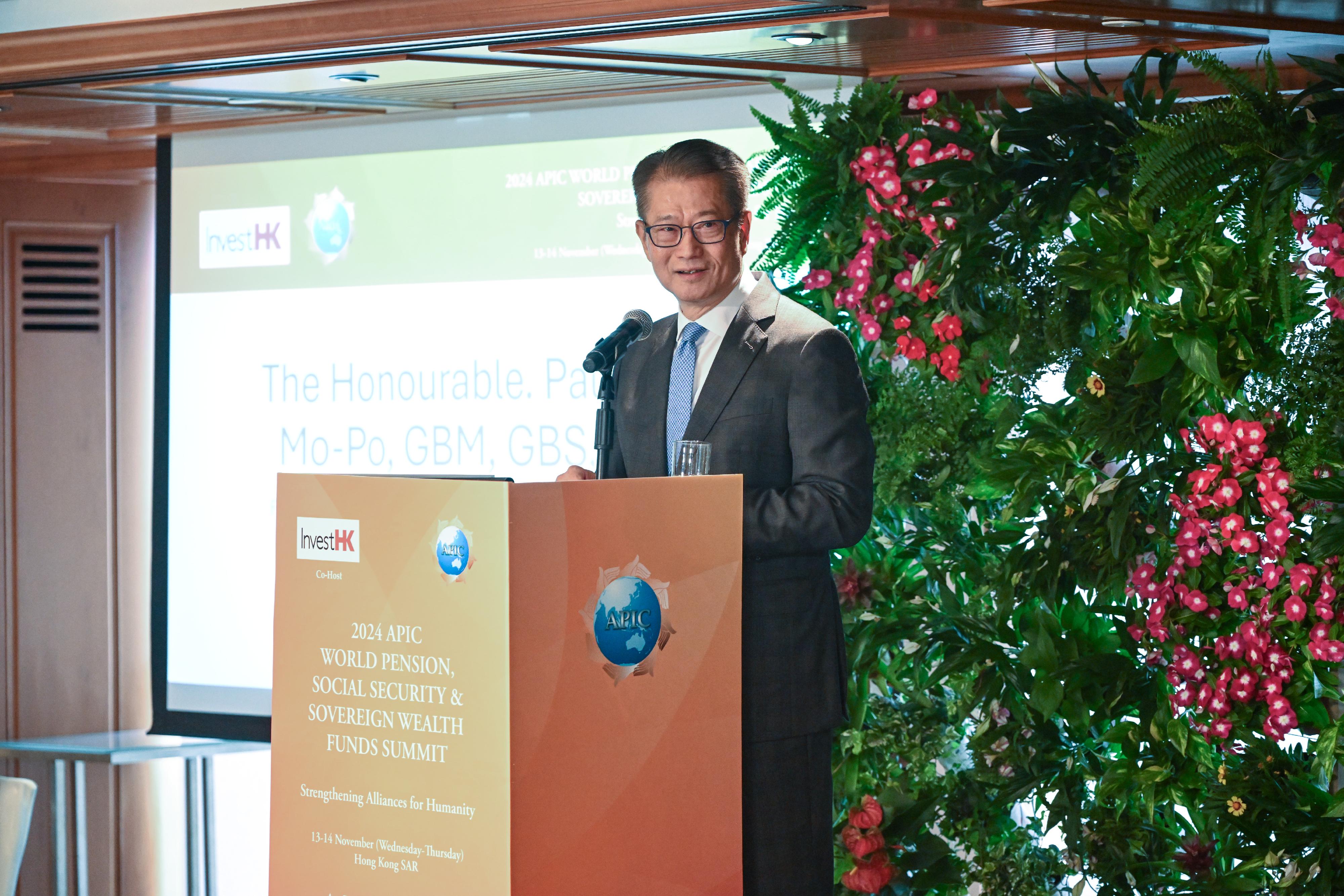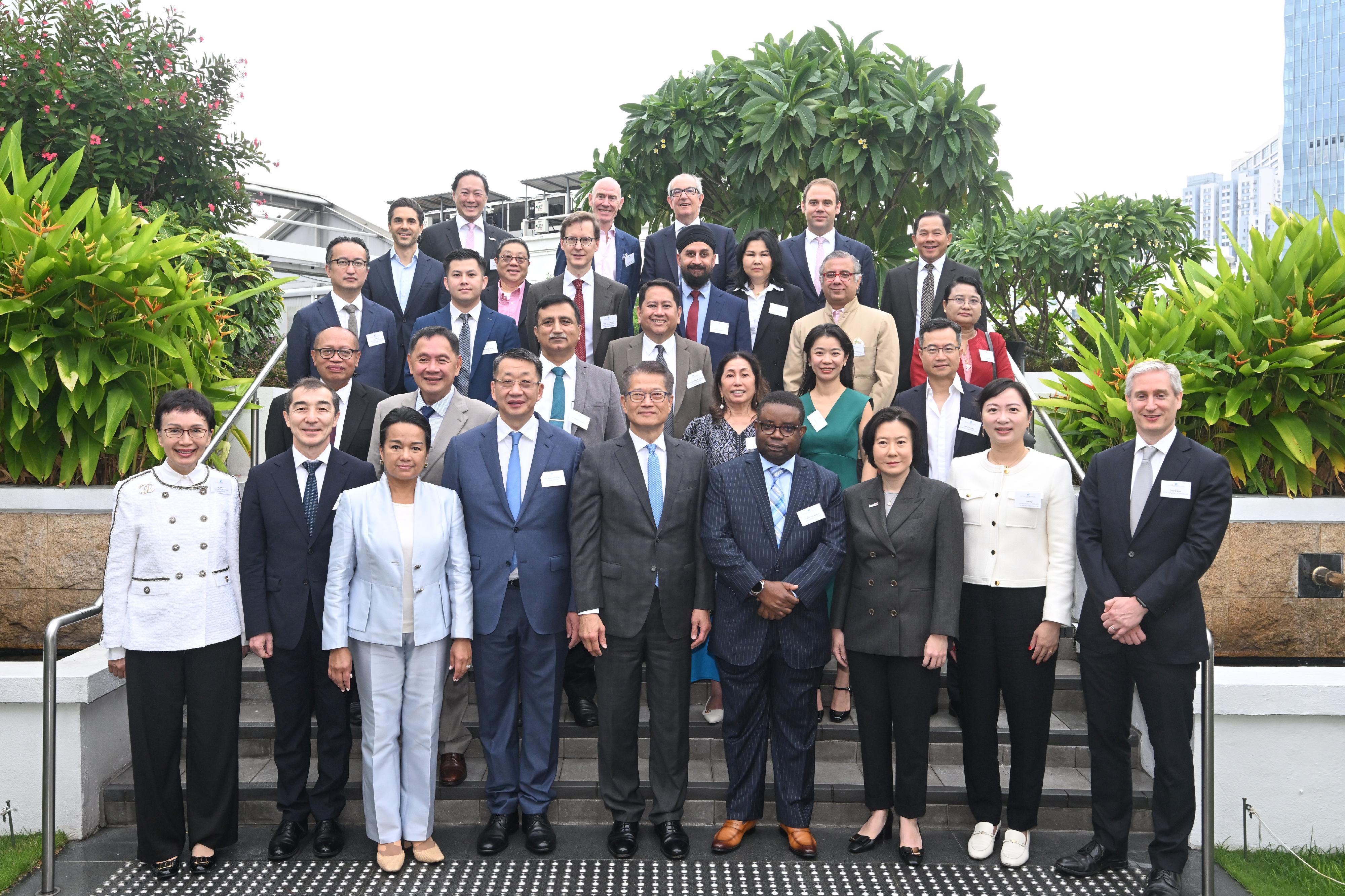Speech by FS at 2024 APIC World Pension, Social Security and Sovereign Wealth Funds Summit (English only) (with photos)
Following is the speech by the Financial Secretary, Mr Paul Chan, at the 2024 Asia Pacific Investors Cooperation (APIC) World Pension, Social Security and Sovereign Wealth Funds Summit today (November 13):
Ana (Founder and Chief Executive Officer of APIC, Ms Ana Sharp), Ka-shi (Chairman of the Hong Kong Trustees' Association, Ms Lau Ka-shi), Alpha (Director-General of Investment Promotion at Invest Hong Kong, Ms Alpha Lau), distinguished guests, ladies and gentlemen,
​Good morning. It is a pleasure to be here at the beautiful Hong Kong Yacht Club to join you all for the 2024 APIC World Pension, Social Security and Sovereign Wealth Funds Summit. Delighted to welcome asset owners, public and private fund managers, institutional investors, and key experts in this field from around the world to gather in Hong Kong.
Pension, social security, and sovereign wealth funds are critical components of the global financial ecosystem. Collectively, these funds manage trillions of dollars in assets, making them one of the largest sources of investment capital worldwide. They are not only investors, but also as key players in shaping market trends and driving economic growth.
Changing landscape of investment
Allow me to share a couple of observations on the changing investment landscape across the globe.
The first is the focus on sustainability. At a time when policymakers worldwide increasingly incorporate ESG (environmental, social, and governance) and net-zero commitments into their policy framework, many public funds are seeking to support and drive sustainable development goals, both at home and abroad, such as investing in clean energy, green infrastructure, and affordable housing.
The second observation is about asset allocation. While public funds normally seek more long-term returns, in the public market, alternative investments are increasingly used as a diversification means to mitigate market volatility risks, with potentially more attractive risk-adjusted returns. As countries seek to support economic development through investing in infrastructure, innovation and technology, or projects of national priorities, more opportunities for alternative investment become available.
The third observation is about shifting economic gravity and the impact of geopolitics. In recent years, emerging markets such as ASEAN (Association of Southeast Asian Nations) countries have become more popular investment destinations, given their rapid economic growth, young population, expanding middle class, and thus potential for higher returns. Meanwhile, at a time of continuing conflicts and geo-economic fragmentation, some funds from the US (United States) or even Europe have been forced to reduce their investment holdings in certain markets; meanwhile, some countries, like those in the Middle East, are diversifying their investments from the traditional US and European markets to other regions, such as Asia. The process is dynamic, complicated and ever changing.
Hong Kong's value proposition
​In face of this rapidly changing global investment landscape, I would submit that Hong Kong is where you should allocate your assets.
In terms of international strengths, Hong Kong enjoys the unique advantages under the "one country, two systems" arrangement. Here is where you could have convenient, and at times, priority access to the vast investment opportunities of China while enjoying all the advantages of a world-class international financial centre.
That means the free flow of capital, goods, people, and talent; the common law and a judiciary that exercises powers independently; a currency pegged to the US dollar; a simple and low tax regime; and regulatory regimes and business practices that align with the best international practices. In other words, a familiar environment to do business and invest.
​"One country, two systems", let me add, will be here in Hong Kong for the long run. It is a solemn commitment of President Xi Jinping and the country.
Every now and then, we hear misconceptions about Hong Kong. For instance, there were reports about the outflow of funds from Hong Kong.
But the facts speak for themselves. Over the years, we have weathered many ups and downs and even crises in the financial market. And we built stronger buffers. Hong Kong's banking system, for example, has a liquidity ratio of over 180 per cent, well above the international requirement of 100 per cent; capital adequacy ratio at 21 per cent, much higher than the 8 per cent requirement. As a matter of fact, bank deposits in the city have risen by over 13 per cent, or US$250 billion, since the beginning of 2022 and until September this year.
​Despite market volatility from time to time, we see global investors gradually restoring confidence in our stock market. In particular, in the stock market rally in late September after the Central Authorities announced a package of stimulus measures, we have seen strong buying interest from American and European investors. They together constituted some 85 per cent of the buy side by value. In terms of investor categories, 90 per cent of them are long-term fund managers and investment banks.
Turning to asset and wealth management, Hong Kong is managing over US$4 trillion of assets, with over half of them sourced from outside Hong Kong and the Mainland. That figure represents some 30 per cent increase from that in 2018. Many asset and wealth management firms are expanding their operations in this city.
Investing in the future of Hong Kong
Looking ahead, the prospects of Hong Kong remain promising, as we continue to invest in the future of this city with the staunch support of the Central Authorities. And that will present valuable and rewarding investment opportunities for investors from all over the world. Let me highlight a few areas.
First, our commitment to sustainability. Hong Kong fully embraces the Paris Agreement and has developed clear action plans to achieve carbon neutrality. But our vision goes beyond this. It is our aspiration to become an international green tech and green finance centre that supports regional and global green transition. For this, we have already laid a solid foundation. As Asia’s leading green finance hub, we have on average issued over US$63 billion in green debts annually over the past three years. That accounts for more than one-third of the total amount of green bonds issued in Asia. For green tech, we are home to over 200 green tech firms that offer a wide range of innovative solutions. Many of them have already expanded their operations in overseas markets.
Our vision extends to cover sustainable infrastructure. Locally, we are fast tracking a number of large-scale infrastructure projects, including the Northern Metropolis, which will be pivotal to Hong Kong's innovation and technology future. At the same time, we are also committed to supporting sustainable infrastructure projects in other countries, through innovative financing arrangements. For instance, over the past two years, Hong Kong arranged two batches of securitised infrastructure loans amounting to US$800 million. They support more than 50 projects in the Global South. But more than that, we also offer our expertise in the planning, construction, operation, and management of infrastructure projects. Many of our operators, like the Airport Authority and MTRC (MTR Corporation Limited), have been working with their global partners in running projects overseas.
Then, there is the Guangdong-Hong Kong-Macao Greater Bay Area (GBA). The GBA, comprising Hong Kong, Macao, and nine Mainland cities in Guangdong Province, is an affluent region with a population of 87 million, and a GDP (Gross Domestic Product) of around US$2 trillion. It is an economic powerhouse of China, home to many tech giants. With the support of the Central Authorities, Hong Kong is enhancing our synergetic collaboration with the GBA, particularly on the tech front. This vision is to turn the GBA into a region led by finance and innovation, one that combines the strengths of the San Francisco Bay Area and the New York Bay Area.
The third area to highlight is our comprehensive strategy to diversify Hong Kong's economy and raise our competitiveness. Innovation and technology is our handle, and we will focus on four strategic areas, namely, AI (artificial intelligence) and big data analytics, biotech, fintech, as well as new materials and new energy. To expedite development of these sectors, we set up the Office for Attracting Strategic Enterprises towards the end of 2022, proactively reaching out to enterprises from the relevant fields. Together with the efforts of other government departments, we have successfully attracted over 100 innovative enterprises to Hong Kong, which together will bring us more than US$6 billion in investments and create 17 000 jobs.
Going hand in hand with our quest for strategic enterprises is our stepped-up effort in attracting talent from all over the world. Our various talent admission schemes have been highly popular. Nearly 400 000 applications have been received so far. We have approved more than 250 000 of them, with more than 160 000 people having already arrived in the city.
And a discussion on investing in Hong Kong's future would not be complete without mentioning the Hong Kong Investment Corporation Limited, or HKIC. As "patient capital", the HKIC has been performing the role of channelling private capital and market resources into the above-mentioned strategic industries. Unlike many other sovereign funds, the HKIC has a dual mandate of seeking a reasonable financial return, and more importantly, of enhancing Hong Kong's competitiveness and economic vitality in the long term through strategic investment. Projects concluded by the HKIC include, among others, one using AI for drug discovery process, and another one exporting top-notch EV (electric vehicle) charging solutions to Thailand. We welcome more collaboration with the private market as we drive investments in innovation and technology that would not only generate financial returns but also create tangible benefits for the community and humanity.
And speaking of the HKIC, I am glad to report that it will also be hosting a Roundtable for International Sovereign Wealth Funds in January next year where participants could gather to share insights, and explore investment opportunities and develop partnerships. You are more than welcome to join.
​Ladies and gentlemen, I hope I have given you some good account about the investment opportunities that Hong Kong offers, and the rewarding returns that could be reaped – not only financially but also socially. I would now be happy to take your questions.

